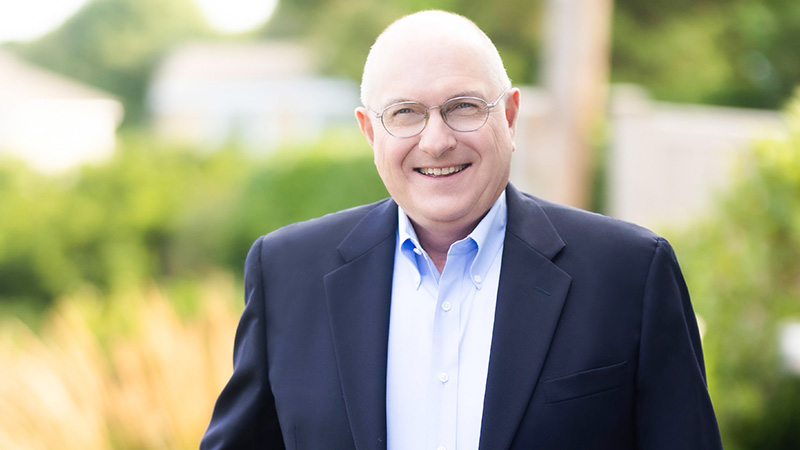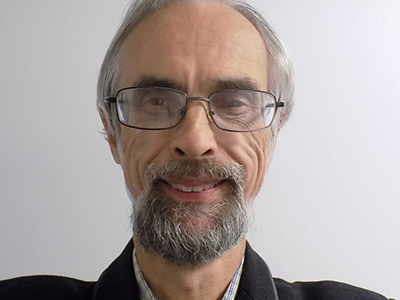Fred Reichheld Is Revolutionizing Customer Service Ratings Again With Love
The inventor of the Net Promoter System, a mega-popular customer rating survey, says businesses need to start applying the Golden Rule to improve their bottom line.

How to Win With Customer Capitalism
You may not know Fred Reichheld's name, but you know that of his child: the Net Promoter System, commonly just called NPS. It is used widely by companies of all sizes as a survey of customers to determine how enthusiastic they are about the products and services. The results are categorized as either “Promoters” (who recommend friends to become customers), “Passives” (who are merely satisfied), or “Detractors” (who complain loudly about their experiences). The Promoters minus the Detractors yields the NPS score.
The long-time winners in this contest that yield impressive shareholder returns include Apple, Nike, Discover Financial Services, T-Mobile, Charles Schwab, Texas Roadhouse, Intuit, First Republic Bank, online pet retailer Chewy, and Warby Parker glasses.
But Reichheld says that nearly two decades after its launch, NPS has been so misused that it needs to be reformed with its new version, NPS 3.0, supported by a new accounting metric that will give ratings credibility with investors, Earned Growth. These are explained in his new book (written with the help of management consultancy Bain & Company partners Darci Darnell and Maureen Burns), “Winning on Purpose: The Unbeatable Strategy of Loving Customers.”
Although two-thirds of the Fortune 1000 use NPS, few consumers would consider the state of service from large corporations to be very good. Most leaders never seem to have held frontline jobs to understand how to keep customers happy or even courses on the subject. This lack of priority for improving service is reflected by the 90% of CEOs of publicly-held firms who disagree with the statement that the "primary purpose of a company should be to enrich customers' lives," which Reichheld has shown is the secret to long-term business success.
Smaller companies have less of a problem because they are closer to their buyers and rely far less on overseas call centers, chatbots, and FAQs that never seem to offer the questions unhappy consumers want answered.
"I've been deeply troubled by how badly most companies are implementing NPS and thus achieving only a tiny fraction of the system's potential," Reichheld said. "Self-reported scores that do reveal details about how they were achieved, inexperienced practitioners, misinterpretations, and manipulation by things like offering incentives for positive ratings have turned these into vanity statistics that have damaged the credibility of NPS. That's why we needed to provide a new approach."
The Evolution of NPS and the 3.0 Revolution
After graduating with a BA from Harvard in 1974, Reichheld earned his MBA from Harvard Business School in 1978, the year after he joined Bain (four years after its founding). In the 1980s, it went through turmoil and nearly went bankrupt. Reichheld was part of the team of a dozen partners who turned it around, led by the CEO hired in 1991, Mitt Romney (now a US senator). It grew 25% per year through the 1990s and became one of the Big Three consultancies, currently ranked by Glassdoor as one of the best places to work.
His first book was “The Loyalty Effect” in 1996, which quantified the enormous beneficial effect for companies that had great long-term customer relationships. This led to an invitation from Jack Brennan, the CEO of the Vanguard Group investment advisory, to give a presentation. When Reichheld asked him how large he thought Vanguard could grow, Brennan responded, "Growth is not our goal. Our goal is to deliver great value for our investors. Striving to grow big will get you in trouble."
Shortly thereafter, he was visiting with Andy Taylor, CEO of privately-held Enterprise Rent-A-Car, which had sprinted past much larger competitors, like Hertz and Avis, despite operating in a low-margin, low-growth industry. When Reichheld asked him the secret of his success, Taylor responded, "You make sure your customers are treated so well that they come back for more and bring their friends." Enterprise's method of getting customer feedback inspired the formation of the Net Promoter System, starting in 2002.
Another early experience that influenced its development came when he visited insurance giant USAA. Its CEO, Bob Herres, explained how he attracted employees who knew how to treat customers right. "Bob taught me that a leader is to ensure that the team is on the right mission and that they know their leader will do everything possible to take care of their safety and well-being," Reichheld wrote.
Bain was the first to implement NPS, according to John Donohue, CEO of Bain 1999-2005 and now at the helm of Nike, who credits Reichheld with "inventing the field of loyalty economics." Bain remains the leader in consulting for firms that want to upgrade relationships with their customers.
In 2011, Reichheld and Bain co-author Rob Markey published “The Ultimate Question 2.0: How Net Promoter Companies Thrive in a Customer-Driven World,” an expanded version of a 2006 book. They were trying to identify NPS leaders relying on market research, but what was available did not allow them to, for example, distinguish between important customer segments (such as prepaid mobile phone vs. prepaid).
That led Bain to develop NPS Prism in 2019 to provide more sophisticated benchmark data. It could now discern that Discover delivers the best customer experience when applying for a new card, while American Express gets the best rating in its response to a request for an increase in a credit line.
"NPS in various forms is very prevalent globally, especially in Europe and Asia, but not just by large companies," Burns told Startup Savant. "It has been widely adopted by leaders in local markets. Franchise operators and entrepreneurs get the logic of the large enterprises and were among the earliest to invite Fred to give keynote addresses at conferences. But companies of all sizes who have been using NPS often do not incorporate the elements of the system, which includes a leadership commitment to make the tough decisions that are in the interest of customers but may not drive financial benefits for the company right away. A culture of customer feedback uses this throughout the organization to make continuous improvement. Even with a digital frontline that provides signals and operational data, humans are still vital to get the real voice of the customer."
Earning Customers
As Reichheld became disenchanted with the way NPS was being implemented, he had an "ah-ha" moment after giving a presentation to one of its users, First Republic Bank. He was so impressed with what he discovered that he switched his personal accounts there. What its leaders had pioneered was a detailed understanding of how much of its growth resulted from customers who referred friends.
At the time, half of all its deposits came from current customers, while those they referred accounted for another 32%, a total of 82%. And 88% of growth in loans was due to those two groups: it has been growing at an average of 15% per year in an industry that typically grows 2% to 3%. It knows because it asks why new customers chose the bank so that regulators don't become suspicious about how they achieve rapid growth.
This led Reichheld to create the earned growth ratio, which measures a company's total growth to what has been "earned" by referral or reputation. "Bought" growth comes from advertising, promotional deals, or commission sales. The first part of the calculation is the total revenues from customers who have been retained for the year, subtracted by those which were lost, yielding the net revenue retention (NRR).
Second is the percentage of spending from earned new customers (ENC). This is often challenging for firms to calculate because they often do not know the reasons why people are buying, but it is important to start finding out.
"In our consulting work, we've seen that most firms find earned new customers to be far more profitable than bought ones, many of whom are actually money-losers over the long-term," Reichheld said.
To determine a company's earned growth rate, add NRR and ENC and subtract 100% to get the growth rate for the year. If you have the data, you can use this earnings growth calculator.
So far, though, GAAP does not recognize the difference between earned growth and that which is bought by means that may be cannibalizing future sales.
"What is exciting is that when we talk with the most sophisticated investors, they look at customer accounting metrics to make investment decisions," said Burns. "As that mentality takes over, leaders will want to report theirs to show their companies have higher quality growth prospects than competitors. We believe that business schools that teach NPS as a strategic tool will introduce students to the new concepts in our book."
While the full system of using artificial intelligence and big data might seem beyond the capability of small-to-medium firms, Burns says survey vendors like Medallia and Delighted (part of Qualtrics) are eager to work with them while Adobe, Salesforce, and others can provide analytics.
The Golden Rule Is Worth Gold
Reichheld's book lists the principles of the Net Promoter (Customer Capitalism) Manifesto:
- Embrace an unbeatable purpose. Putting the enrichment of customer lives foremost is an organization's North Star for long-term success.
- Lead with love. The primary duty of leaders is to enable the success of their teams by allocating sufficient time, education, and resources.
- Inspire teams. Team members must be empowered to root out procedures and behaviors that are contrary to the Golden Rule.
- Unleash NPS-caliber feedback flows. Constant innovation is required for collecting, curating, and distributing the right feedback in a world overwhelmed with data flow.
- Nurture relentless learning. Leaders must create a culture where workers can receive feedback on their performance in the same space.
- Quantify earned growth economics. Companies must utilize customer-based accounting metrics to evaluate trade-offs and investment decisions.
- Regularly redefine the remarkable. Leaders need to strive to invent new ways to delight customers continuously.
"Artificial Intelligence requires many more years of development to approach the genius of human intelligence," Reichheld, Burns, and Darnell wrote. "Machines can never understand or replace human love. The unbeatable strategy of loving customers will always depend on us humans."
About the Author

Scott S. Smith has had over 2,000 articles and interviews published in nearly 200 media, including Los Angeles Magazine, American Airlines’ American Way, and Investor’s Business Daily. His interview subjects have included Bill Gates, Richard Branson, Meg Whitman, Reed Hastings, Howard Schultz, Larry Ellison, Kathy Ireland, and Quincy Jones.
Startup Resources
- Learn more about Startups
- Visit the TRUiC Business Name Generator
- Check out the TRUiC Logo Maker
- Read our Business Formation Services Review
- Find Startup Ideas
- Explore Business Resources
Form Your Startup
Ready to formally establish your startup? Click below to read our review of the best business formation services!
Best Business Formation Services